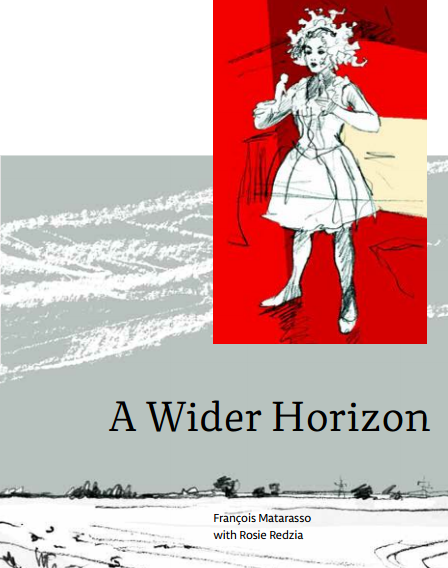
Book Review: A Wider Horizon
How and why do rural touring companies thrive? Sue Robinson reviews the latest contribution from Francois Matarasso, a writer who has been helping her to answer similar questions for 20 years.
A Wider Horizon combines Matarasso’s gently authoritative tone, with original drawings by Rosie Redzia, to create an homage to the characters, landscape, passions and challenges that constitute the world of rural touring. Seen through the eyes of one company, Creative Arts East, it explores the network’s history and recent practice. It guides the reader through stories about village festivals, shows in pubs, active communities, and the passions of volunteers who promote the arts simply because they love it.
I first made contact with Francois Matarasso’s writing in 1994, when I acquired my Post Grad qualification in Community Arts, and walked out into the cold world of freelance (unemployment) clutching a copy of ‘Regular Marvels’, a handbook for animateurs and practitioners. Written by Matarasso and other contributors, it was a handy guide to all things practical in the arts and a reassuringly gentle voice for those new to the field, with advice such as: “How to set up an office” or “How to write a project application.” It even had a list of addresses in the back to whom you could post a letter.
Matarasso puts a firm case for the democratic nature of the sector, how affordable it is to tightened public purses
Twenty one years later, and 17 years into running a rural touring scheme, I find myself being invited by the National Rural Touring Forum to review Francois’ newest publication, ‘A Wider Horizon’. Suddenly, I feel a little bit old. I even employ a member of staff who “studied Matarasso at uni; he’s amazing”. It feels like a dual journey.
Using a variety of characters and images, the book argues that the relationship between artist, community and small venue makes rural touring more than a service: it's a philosophy or a movement. I run a rural touring network in Lancashire and I smiled with recognition whilst flicking through the pages of this highly readable book; the voices quoted could be from our villages, and the promoters could be our promoters, just with different accents. This is not just a “how to” guide, however. It contains real soul and passion for its subject. Rosie Redzia’s delightful sketches complement the writing, showing another parallel narrative, with what is seen and felt being as important as what is said in the book.
It can sometimes be a struggle to explain rural touring. So read this. It will help you understand how and why the sector has managed to grow and thrive. It leaves you feeling that there is much that is good in the arts in England. Doubly so in rural England.
But this book is not about heritage or preservation. Matarasso puts a firm case for the democratic nature of the sector, how affordable it is to tightened public purses (funder and audience alike), and what good value it offers. Volunteers make it practical and give the sector human depth. It explores why a model can work in one village, but not another, and hits on some of the underlying challenges rural communities face.
Matarasso’s writing is always quotable. I’m trying to avoid quoting too much, as I’d use up the whole book, but he uses a useful term from the Environment Agency – managed realignment – to explain how rural communities and artists are adapting to public cuts. Managed realignment means allowing nature to do to the coast what it must, with the land adapting to the new reality. In many ways, rural touring will weather the storm it's facing – if only because rural communities themselves always find ways to survive and adapt.
I have one small fear for this book. A Wider Horizon is in danger of being a snapshot, a photo album of a particular place in time. The sector as a whole should work to make sure it is not just found on a shelf in twenty years’ time, by someone like me, only for us to end up being nostalgic about the good old days of public funding when ‘communities were real communities’ and ‘artists were real artists’. The book demonstrates a way to explore, discuss and evaluate activity in a manner that is human and meaningful. It is a pulse check, and regular check-ups may be required.
Like the first Matarasso book I owned, this will guide you gently by the hand along the hills and valleys of rural touring, and leave you resting on a bench, reflecting on the story and appreciating the wider horizon before you.
Sue Robinson is the Director of Culturapedia, the managing agency for Spot On, Lancashire’s Rural Touring Network.
www.spotonlancashire.co.uk
E Sue @culturapedia.co
T 01254 660360
Download a digital copy of A Wider Horizon, by clicking on this link: A Wider Horizon (PDF 5MB). Printed books are available from Creative Arts East, telephone: 01953 713390 or Email: [email protected].
Join the Discussion
You must be logged in to post a comment.